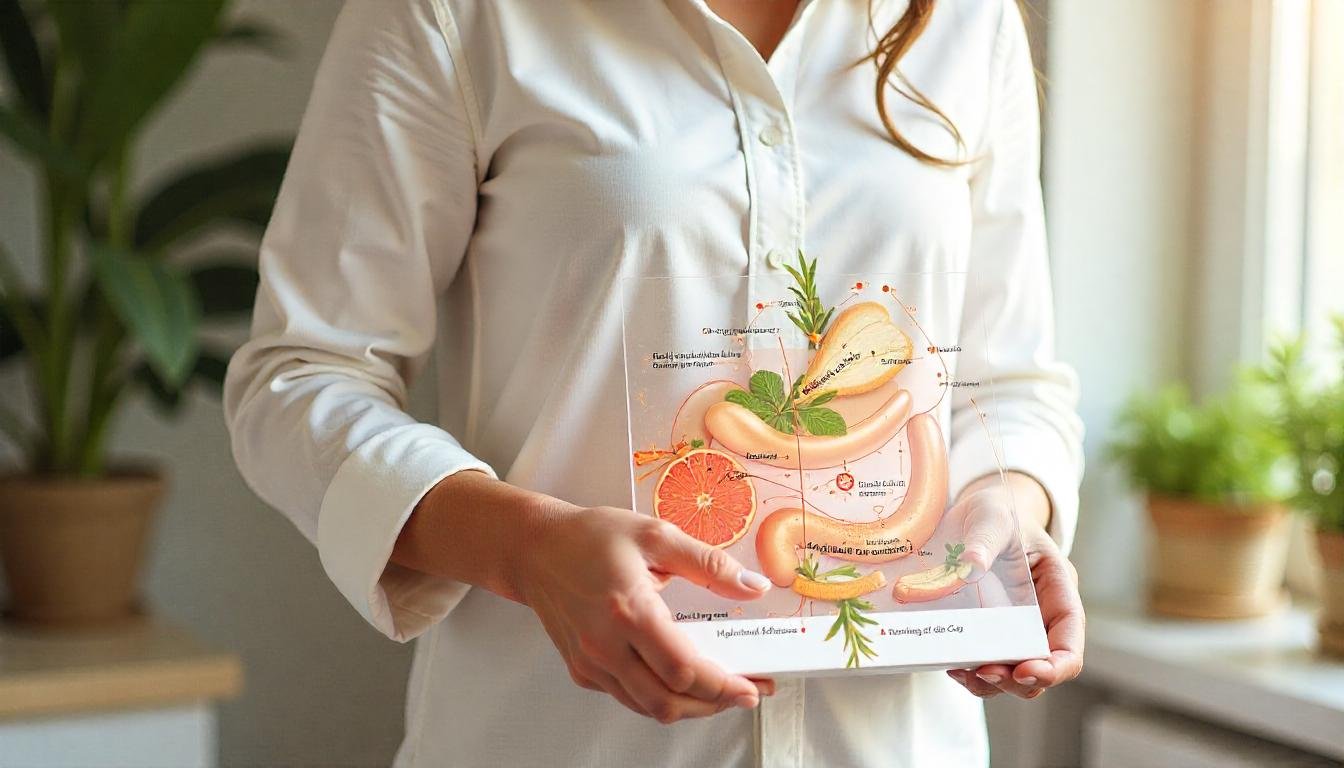Introduction: The Gut-Sleep-Energy Connection
If you have ever found yourself lying awake at night, exhausted but restless, or dragging through your day no matter how many cups of coffee you drink — your gut might be trying to tell you something.
Most people do not realize that our gut does far more than digest food — it’s deeply connected to how we sleep, how much energy we have, and even how we feel emotionally. Through the powerful gut-brain axis, your digestive system and brain are in constant communication, influencing everything from mood swings to insomnia.
This blog will guide you step-by-step through how to heal your gut naturally so you can sleep better, feel more energized, and truly thrive. Whether you’re dealing with fatigue, poor sleep, or simply want to feel more like yourself again, the solutions often start in the belly.
Let’s dive into how healing your gut could be the key to unlocking the vibrant, restful life you’ve been missing.
Table of Contents
Understanding the Gut-Brain Axis
The gut-brain axis is a communication network linking your gastrointestinal tract and central nervous system. This connection means that your gut health can directly impact your sleep and energy levels. For instance, the gut produces about 90% of the body’s serotonin, a neurotransmitter that regulates mood and sleep. Disruptions in gut health can lead to decreased serotonin levels, affecting sleep quality and energy.
Signs Your Gut Needs Healing

Recognizing the signs of an unhealthy gut is the first step toward healing. Common indicators include:
- Digestive Issues: Bloating, gas, constipation, or diarrhea.
- Sleep Disturbances: Difficulty falling or staying asleep.
- Chronic Fatigue: Persistent tiredness despite adequate rest.
- Mood Swings: Anxiety, depression, or irritability.
- Food Intolerances: Sensitivity to certain foods.
These symptoms suggest an imbalance in your gut microbiome, which can disrupt the production of sleep-regulating hormones and affect energy metabolism.
Dietary Strategies for Gut Healing
1. Increase Fiber Intake
Fiber feeds beneficial gut bacteria, promoting a healthy microbiome. Aim for a variety of fiber-rich foods:
- Fruits and Vegetables: Apples, bananas, broccoli, and leafy greens.
- Whole Grains: Oats, quinoa, and brown rice.
- Legumes: Lentils, chickpeas, and black beans.
A diverse fiber intake supports gut health and can improve sleep quality.
2. Incorporate Fermented Foods
Fermented foods introduce beneficial probiotics into your gut:
- Yogurt and Kefir: Rich in live cultures.
- Sauerkraut and Kimchi: Fermented vegetables with probiotics.
- Kombucha: A fermented tea beverage.
Regular consumption can enhance gut microbiota diversity, supporting better sleep and energy levels.
3. Limit Processed Foods and Sugars
Processed foods and added sugars can disrupt gut balance:
- Avoid: Sugary snacks, sodas, and processed meats.
- Choose: Whole, unprocessed foods.
Reducing these can decrease inflammation and promote a healthier gut environment.
4. Stay Hydrated
Adequate hydration supports digestion and nutrient absorption:
- Water: Aim for 8–10 cups daily.
- Herbal Teas: Chamomile or peppermint can soothe the digestive tract.
Proper hydration aids in maintaining a balanced gut microbiome.
Lifestyle Changes for Gut and Sleep Health
1. Establish a Consistent Sleep Schedule
Going to bed and waking up at the same time daily regulates your circadian rhythm, improving sleep quality and gut health.
2. Manage Stress
Chronic stress negatively impacts the gut-brain axis. Incorporate stress-reducing practices:
- Meditation and Deep Breathing: Calm the nervous system.
- Yoga: Combines physical movement with mindfulness.
- Journaling: Helps process emotions and reduce anxiety.
These practices can enhance gut health and improve sleep.
3. Regular Physical Activity
Exercise promotes gut motility and reduces stress:
- Aerobic Activities: Walking, cycling, or swimming.
- Strength Training: Supports overall health.
Aim for at least 30 minutes of moderate exercise most days.
4. Limit Screen Time Before Bed
Blue light from screens can disrupt melatonin production. Avoid screens at least an hour before bedtime to support natural sleep cycles.
Foods That Promote Sleep and Energy
Certain foods can enhance both gut health and sleep quality:
- Kiwi: Rich in antioxidants and serotonin, aiding sleep.
- Bananas: Contain magnesium and potassium, relaxing muscles.
- Oats: Provide melatonin and complex carbohydrates.
- Fatty Fish: High in omega-3s and vitamin D, supporting serotonin production.
- Almonds and Walnuts: Sources of melatonin and magnesium.
- Dark Leafy Greens: Offer prebiotics and magnesium.
- Herbal Teas: Chamomile and valerian root promote relaxation.
Creating a Gut-Friendly Evening Routine

A well-designed evening routine can make all the difference when it comes to gut health, sleep quality, and overall energy. Our body is naturally inclined to wind down at the end of the day, but modern life often disrupts that process, especially if we’re stressed or exposed to blue light from screens. By focusing on gentle self-care and gut-friendly habits in the evening, you can support your digestion, calm your mind, and prepare your body for a restful night of sleep.
Here’s how to create a gut-friendly evening routine that promotes better sleep, improved energy, and overall well-being.
1. Gentle Stretching or Yoga to Relieve Tension and Improve Digestion
After a long day, your body might feel tense, especially in the abdomen and lower back, areas where stress often manifests. Gentle stretching or yoga can help relax these muscles and stimulate digestion.
- Simple yoga poses, like Child’s Pose or Seated Forward Fold, are gentle ways to stretch the abdominal area, releasing tension and promoting better digestion.
- Twists, such as Supine Twist, can help massage the internal organs, supporting the digestive process and relieving bloating.
- Deep Breathing Exercises: Practice deep, slow breathing while doing your stretches. This activates the parasympathetic nervous system, which promotes relaxation and supports gut health by reducing stress and inflammation.
2.Enjoying a Calming Cup of Herbal Tea
Herbal teas can play a significant role in supporting digestion and encouraging relaxation before bed. Certain herbs have natural soothing properties that help promote a healthy gut and improve sleep quality. Here are a few to consider:
- Chamomile Tea: Known for its calming effects, chamomile can reduce inflammation in the gut and help with indigestion. It also supports the production of melatonin, the sleep hormone.
- Peppermint Tea: Excellent for soothing the digestive system, peppermint can help with bloating, gas, and indigestion, making it an ideal choice if you’ve had a heavier meal.
- Ginger Tea: If you suffer from nausea or digestive discomfort, ginger tea is perfect for calming an upset stomach and promoting healthy digestion.
- Lavender Tea: This gentle herb is not only soothing for the stomach but also helps relax the mind and body, making it a great choice for winding down.
3. Mindfulness and Meditation for a Calm Mind and Gut
The mind-gut connection is powerful. When you’re stressed or anxious, your body releases stress hormones, which can irritate the digestive system and disrupt sleep. This is where mindfulness and meditation come into play.
- Mindfulness Meditation: Spend 5–10 minutes sitting in a quiet space, focusing on your breath, and allowing any stress or tension to melt away. Focus on inhaling calmness and exhaling stress. You can use guided meditation apps like Headspace or Calm, or simply listen to your breathing.
- Progressive Muscle Relaxation: This technique involves consciously relaxing each muscle group in your body, starting from your toes and working your way up. By focusing on relaxing your muscles, you can reduce overall tension and stress, helping your gut to unwind as well.
- Visualization: Imagining a peaceful scene, like a quiet beach or a calm forest, can help soothe your nervous system. Studies have shown that this practice can improve digestion and reduce stress-induced gut discomfort.
By practicing these techniques, you will lower your stress levels, which helps improve your gut health and promotes better sleep.
4. Avoiding Heavy Meals and Late-Night Snacking
Eating late at night can disrupt your digestion and interfere with sleep. When your body is still processing food while you’re trying to sleep, it can cause discomfort and poor sleep quality. Here’s how to avoid these issues:
- Finish Eating 2–3 Hours Before Bed: This gives your digestive system time to break down food properly before you lie down. Eating too close to bedtime can increase the likelihood of acid reflux, bloating, and restless sleep.
- Choose Light, Gut-Friendly Snacks: If you’re hungry in the evening, opt for light, gut-healing snacks. A small serving of yogurt with honey, banana with almond butter, or a handful of almonds can provide gentle nourishment without overwhelming your digestive system. These snacks are also good sources of magnesium, which supports relaxation and sleep.
- Avoid Processed or Spicy Foods: Processed and spicy foods can irritate the stomach lining, especially before bed. Steer clear of fried foods, heavy meats, or spicy sauces that can cause indigestion and disrupt your sleep.
By focusing on lighter meals in the evening, you help prevent digestive discomfort and improve your sleep quality.
5. Dim the Lights and Reduce Blue Light Exposure
The body’s natural sleep-wake cycle, known as the circadian rhythm, is sensitive to light. Exposure to bright lights, especially blue light from screens, can interfere with melatonin production and disrupt your sleep.
- Dim Your Lights: As you begin to wind down for the evening, dim the lights in your home. Soft, warm lighting signals to your body that it’s time to relax.
- Avoid Screens: Try to avoid the use of phones, tablets, or computers at least an hour before bed. If you must use devices, consider using blue light-blocking glasses or enable “night mode” on your phone.
- Try Candlelight: Lighting a candle in the evening can create a calming ambiance and act as a gentle signal to your body that the day is coming to a close.
By reducing light exposure and taking a break from screens, you help your body prepare for a restful sleep, supporting both your brain and gut health.
A gut-friendly evening routine isn’t just about following a set of steps — it’s about building healthy habits that nurture both your body and mind. By incorporating gentle movement, soothing teas, mindfulness practices, and proper sleep hygiene, you’ll create the perfect environment for both a rested body and a healthy gut.
Remember, consistency is key. Small changes, when practiced regularly, can lead to significant improvements in your sleep quality, energy, and overall well-being. So, take the time to establish an evening routine that works for you — your gut will thank you.
Supplements to Support Gut Health and Sleep
Certain supplements can aid in restoring gut health and improving sleep:
- Probiotics: Support a healthy gut microbiome.
- Prebiotics: Feed beneficial gut bacteria.
- Magnesium: Promotes relaxation and sleep quality.
- Melatonin: Regulates sleep-wake cycles.
- L-Theanine: Reduces stress and promotes relaxation.
Consult with a healthcare professional before starting any new supplement regimen.
The Role of Sleep Hygiene in Gut Health

Good sleep hygiene practices can positively impact gut health:
- Maintain a Consistent Sleep Schedule: Supports circadian rhythms.
- Create a Relaxing Bedtime Routine: Signals the body to prepare for sleep.
- Optimize Sleep Environment: Keep the bedroom cool, dark, and quiet.
- Limit Caffeine and Alcohol: Both can disrupt sleep patterns.
- Engage in Regular Physical Activity: Promotes better sleep quality.
Implementing these practices can enhance both sleep and gut health.
Monitoring Progress and Adjusting Strategies
Healing your gut and improving sleep is a journey. Monitor your progress and adjust strategies as needed:
- Keep a Journal: Track dietary intake, sleep patterns, and symptoms.
- Seek Professional Guidance: Consult with healthcare providers for personalized advice.
- Be Patient: Healing takes time; celebrate small victories along the way.
Conclusion: Embrace the Journey to Better Gut Health, Sleep, and Energy
If you’ve made it this far, you’re already taking one of the most important steps — becoming more aware of how your body works and what it needs to thrive.
Healing your gut isn’t about perfection. It’s about creating daily habits that support your body, one bite, one breath, one good night’s sleep at a time. Whether you start by adding more fiber to your meals, drinking herbal tea before bed, or simply paying closer attention to how your body feels after certain foods — small, consistent changes lead to lasting transformation.
This blog has walked you through the essential tools and habits to support your gut, improve your sleep, and boost your energy naturally — all from a place of real care and personal empowerment. Now it’s your turn to take action, listen to your gut (literally), and begin building a healthier, more vibrant life from the inside out.
You’ve got this — and your body will thank you.
Frequently Asked Questions (FAQ)
1. How can I tell if my gut is unhealthy?
- Digestive issues like bloating, gas, or constipation.
- Fatigue or feeling sluggish despite getting enough sleep.
- Frequent headaches or difficulty concentrating.
- Mood swings, anxiety, or depression.
- Skin problems, such as acne or eczema, which can sometimes be linked to gut health.
- Autoimmune issues, which may be triggered by an imbalanced gut microbiome.
2. What foods help heal your gut?
- Fermented foods: Think yogurt, kefir, kimchi, sauerkraut, and kombucha — these are packed with probiotics, beneficial bacteria that promote gut health.
- Fiber-rich foods: Whole grains, fruits, vegetables, and legumes provide prebiotics, which act as food for your healthy gut bacteria.
- Bone broth: This nourishing food is rich in collagen and amino acids that support gut lining repair and overall digestive health.
- Ginger and turmeric: Both have anti-inflammatory properties that can soothe digestive issues and support gut healing.
- Healthy fats: Avocados, nuts, and seeds contain healthy fats that can reduce gut inflammation and support the absorption of essential nutrients.
3. How does gut health affect sleep and energy levels?
Your gut is sometimes referred to as your “second brain,” and for good reason. The gut-brain axis connects your digestive system with your central nervous system, influencing everything from your mood to your sleep cycles. Here’s how:
- Gut health and sleep: The gut microbiome helps produce key neurotransmitters like serotonin, which plays a crucial role in regulating your sleep-wake cycle. An imbalance in gut bacteria can affect serotonin production, leading to sleep disturbances or insomnia.
- Gut health and energy: An unhealthy gut can lead to nutrient malabsorption, meaning your body isn’t getting the full energy it needs from food. Inflammation in the gut can also lead to chronic fatigue and sluggishness.
4. Can probiotics improve gut health and sleep?
Yes! Probiotics are live bacteria that provide numerous health benefits, particularly for gut health. When it comes to sleep, probiotics have been shown to:
- Balance gut bacteria: By restoring the right balance of bacteria in your gut, probiotics can help reduce digestive issues like bloating, constipation, and diarrhea.
- Reduce inflammation: Inflammation in the gut can disrupt sleep, but probiotics can help soothe the digestive system and lower systemic inflammation, leading to more restful sleep.
- Enhance serotonin levels: As mentioned earlier, serotonin is crucial for sleep regulation, and probiotics can help improve serotonin production by balancing gut microbiota.
5. Can I heal my gut naturally, or do I need supplements?
While gut healing can certainly be supported by supplements, the foundation of gut health starts with a balanced diet and healthy lifestyle choices. Here’s how you can approach gut healing:
- Diet: Focus on gut-nourishing foods like fiber, fermented foods, and healthy fats. Incorporating prebiotics and probiotics into your meals is key to nurturing gut health.
- Lifestyle: Regular exercise, stress management, and sufficient sleep all play a role in maintaining a healthy gut.
- Supplements: While you can absolutely heal your gut naturally through diet and lifestyle, some people benefit from gut-healing supplements, such as probiotics, digestive enzymes, L-glutamine (for gut lining repair), and collagen. However, it’s always a good idea to consult a healthcare professional before starting any new supplements.
